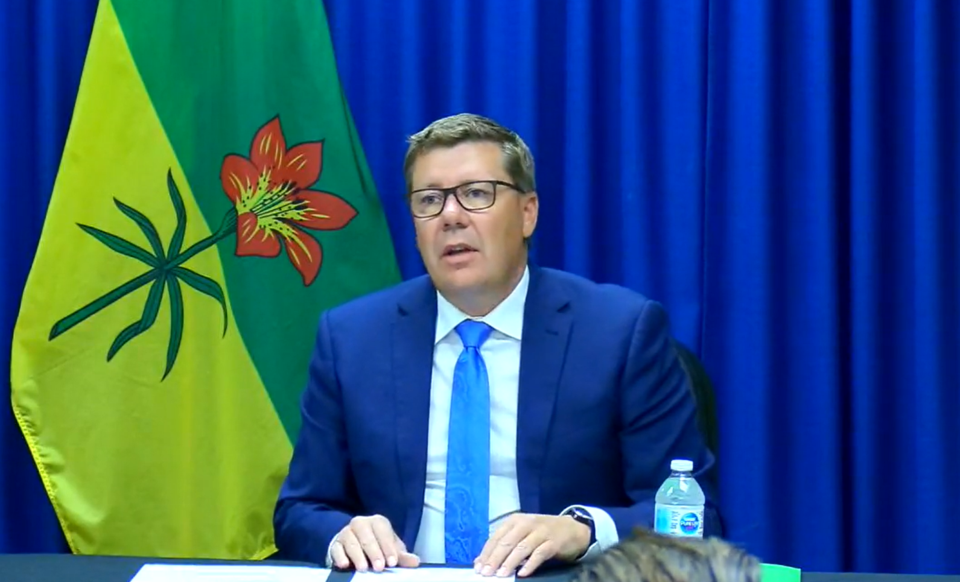REGINA — Following repeated calls from opposition, medical experts and the public, the provincial government announced this morning that changes to public health efforts regarding COVID-19 are coming to Saskatchewan.
Premier Scott Moe, Chief Medical Health Officer Dr. Saqib Shahab and Sask. Health Authority CEO Scott Livingstone held a press conference in Saskatoon to share details.
Beginning immediately, a 10-day self-isolation mandate is back in play for all residents who test positive for COVID-19.
Close contacts of a positive test who are unvaccinated will also have to self-isolate for 10 days, while those vaccinated will be required to self-monitor.
Testing and contact tracing capacities will be expanding by contracting third-party services to deliver them, said Moe, and the booster vaccine program is underway for the most vulnerable of the population.
The province has also purchased one million self-testing kits to provide to the SHA’s Test to Protect program, made available to health care facilities and workers, shelters, group homes, first responders, and to schools and families for at-home testing. The first half is set to be delivered next week, promised Moe.
Targeted slowdowns of non-critical health services will also be taking place, to help re-allocate workers and resources to urgent and acute care areas.
Livingstone said the changes will look much like the slowdowns from the beginning of the pandemic, with the goal of freeing up staff in everyday services to relieve pressures on emergent care.
“Part of our planning today, for service reduction, is building 80 bed capacity in ICUs for COVID patients and 255 in-patient beds,” said Livingstone. “That is what the teams have been directed provincially to do, for this first wave of building capacity.
“Building capacity does not slow down the virus,” he continued. “It allows us to deal with the outcomes of being infected.”
The provincial government has also purchased 8,500 MRI and CT scans from private services and promised an additional 2,300 scans in smaller hospitals, to provide to patients in an effort to lessen wait times as SHA services slow down.
The previously announced vaccination policy for frontline health care workers has also been expanded to include all SHA staff, with details to be shared in the near future.
“It is a duty of care to get vaccinated, if you provide essential services,” said Shahab.
Moe said that the announced changes are meant to relieve some pressure from frontline workers currently swamped with COVID-related patients in hospital ICUs.
He also said the changes are meant to encourage remaining unvaccinated residents to get their shots, without implementing a province-wide requirement to do so.
“I would like to see every eligible person in Saskatchewan get vaccinated, but I also firmly believe that being vaccinated is a choice,” said Moe. “And creating two classes of citizens based on your vaccination status is very difficult and is a very divisive path for a government to take.”
Instead, the onus will remain on municipalities, businesses and organizations to enforce vaccination requirements, with aid from the government in the form of the coming vaccine QR code.
Shahab said that Saskatchewan does need to see an uptake in the current rate of vaccination, to see more accurate protective coverage for the general population.
“We need to go up about 10 to 15 per cent [in vaccination rates] very quickly,” said Shahab. “Even 20 per cent [of the population] unvaccinated can cause surges in cases like we’re seeing.”
The premier made clear that a mask mandate is not currently on the table, once again calling the idea a “stop-gap measure.” Shahab encouraged residents to wear masks where appropriate, especially in public indoor spaces.
Moe said that officials remain determined that vaccination is “the best tool we have '' in Saskatchewan, and that the measures announced today “measure up” to those in place in other provinces.
“As we head into the fall, I think we will have to look at all the tools we have – vaccination, re-looking into social distancing, mask use, other measures,” said Shahab. “At our current case rates, I think we are looking at a significant surge unless we course-correct.”
The update follows a public rally held outside of the Legislative Building in Regina yesterday, where members of the public demanded more action from provincial officials to address Saskatchewan's current wave of COVID-19.



